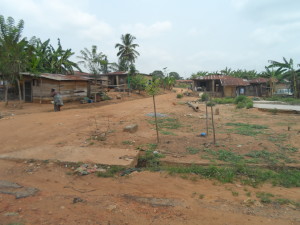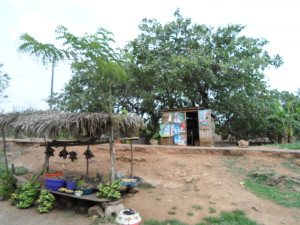Ni ayé àtijọ́, kò si ohun ti ó njẹ́ Agbalésanwó nitori kò si ẹni ti kò ni ẹbi ti wọn lè bá gbé ni ọ̀fẹ́. Kò wọ́pọ̀ ki èniyàn kúrò ni ilé lati lọ gbé ilú miran. Iṣẹ́ meji ti ó wọ́pò ni ayé àtijọ́ ni iṣẹ́ àgbẹ̀ àti òwò nipa ti ta irè oko ni ọjọ́ Ọjà Oko lati Abúlé kan si ekeji. Kò si ohun irinna bi ayé òde òni, nitorina ẹsẹ̀ ni wọn fi nlọ lati ilú kan si ekeji. Yorùbá fẹ́ràn àlejò, nitori eyi, bi Oniṣòwò bá lọ si Ọjà Oko ni ilú miran, ti kò lè délé ni ọjọ́ ti ó gbéra, yio ri ilé sùn ni abúlé ti ó bá dé ti ilẹ̀ fi ṣú lai sanwó. Olóko ni o ma npèsè ibùgbé fún Alágbàṣe ti wọn bá gbà fún iṣẹ́ oko, nitori eyi, kò si pé àlejò gba ilé lati sanwó.
Ni igbà ti ó yá, èrò bẹ̀rẹ̀ si kúrò lati ilú kan si ekeji, pàtàki nitori ọ̀gbẹlẹ̀, iyàn, ogun tàbi ẹni ti wọn lé kúrò ni ilú nitori iwà burúkú. Eleyi fã ki ilú kan fẹ̀ ju òmíràn lọ, pàtàki ni ilú ti ó bá sún mọ́ odò nla bi ti ilù Èkó nitori iṣẹ́ ma npọ̀.
Ni ayé òde òni, ọ̀pọ̀lọpọ̀ ọ̀dọ́ má a nkúrò ni ilé lati wá iṣẹ́ lọ si ilú miran. Ó rọrùn fún ẹni ti ó kàwé àti oníṣẹ́ ọwọ́ lati ri iṣẹ́ nitori oriṣiriṣi iṣẹ́ pọ ni ilú nlá, ju ilú kékeré lọ. Eleyi jẹ́ ki ilú nlá bẹ̀rẹ̀ si fẹ si. Gẹ́gẹ́ bi òwe Yorùbá “Ọ̀kọ́lé kò lè mu ràjò”, bẹni kò si bi ẹni ti ó kúrò ni ilé ti lè gbé ilé dáni lọ si ilú nlá. Àlejò bẹ̀rẹ̀ si pọ̀ si ni ilú nlá ṣùgbọ́n ilé gbigbé kò kári.
Àṣà ti ó wọ́pọ̀ ni ki Onilé gba owó ọdún kan tàbi meji. Elòmìràn ngba ọdún mẹta fún owó à san silẹ̀. Ilé wá di ohun à mu ṣowó. Oriṣiriṣi àwọn oniṣẹ́ “Abániwálé” wá pọ̀ si. ọ̀pọ̀ Onilé àti Abániwále bẹ̀rẹ̀ si lu jìbìtì nipa gbi gba owó lọ́wọ́ ọ̀pọ̀lọpọ̀ Agbalésanwó lóri ilé kan ṣoṣo, òmíràn ngba owó lóri ilé ti ki ṣe ti wọn. Yorùbá ni “Alágbàtà tó nsọ ọjà di ọ̀wọn”, bi ilé bá ti wọn tó ni owó ti Abániwále má a ri gbà ti pọ̀ tó. Eyi jẹ́ ki wọn sọ ilé di ọ̀wọ́n, nitori owó ti wọn má a ri gbà lọ́wọ́ Onilé àti Agbalésanwó lai ro inira Agbalésanwó.
ENGLISH TRANSLATION
In the olden days, there was no Tenancy because there is no one without a family home that they can live in for free. It was also uncommon to leave home for another City permanently. The common jobs in those days were agriculture and trading agricultural products from one village to another. There were no common means of transportation like in the modern time, hence people connect to other communities by walking. Yoruba love hosting strangers/visitors, hence, if a Trader returning from a local village farmers market is unable to reach home, he/she will be accommodated to sleep over for free in the nearest community. Farmers on the other hand, provide accommodation for farm labourers, hence Guests/Visitor did not have to pay for accommodation.
Sometimes later, people began to relocate from one community to another, particularly during Drought, Famine, War or those ostracised from the community for committing crime. As a result, the big cities began to be over populated, particularly cities that are close to the River/Ocean such as Lagos.
Nowadays, many youths leave home in search of greener pastures. It is easy for the educated or skilled youths to find a job in the big cities because there are more jobs there than in the smaller towns, thereby increasing the population of the big cities. According to the Yoruba adage that said “Home owners cannot relocate with their homes”, hence there is no way of relocating to the big cities with a house. The population were increasing but living accommodation were not.
The common culture is for the Landlord/Landlady to collect one or two years advance rent. Some even collect up to three years deposit. Housing became a money spinning business. The number of “Estate Agents also referred to as the middlemen” have been on the increase. Some Landlords/ Landladies and Estate Agents are using their position to commit fraud by collecting deposit from many Tenants for the same vacant house or a fictitious house. Another Yoruba adage said, “The Middleman that causes inflation”, the more expensive the rent, the more the Estate Agent’s commission. As a result, rent are inflated without any consideration of the untold hardship it causes the prospective Tenant.
Originally posted 2015-09-04 07:30:37. Republished by Blog Post Promoter




